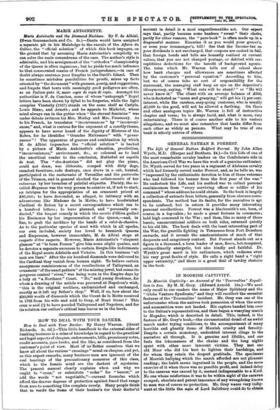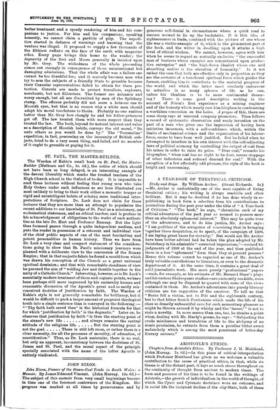IN MOORISH CAPTIVITY.
In Moorish Captivity : an Account of the 'Tourmaline' Expedi- tion in Sus. By H. AL Grey. (Edward Arnold. 16s.)—We need only recall to our readers the name of Major Spilsbury and the "Globe Venture Syndicate," and they will recollect the essential features of the 'Tourmaline' incident. Mr. Grey was one of the unfortunates whom the natives took possession of when the arms and ammunition were not landed. His captors handed him over to the Sultan's representatives, and then began a wearying march to Mogador, which is described in detail. This, indeed, is the feature of Mr. Grey's book,—the circumstantial detail of an awful march under trying conditions, to the accompaniment of many horrible and ghastly items of Moorish cruelty and ferocity. Despite a certain monotony, undoubted interest clings to the narrative all through. It is genuine and lifelike, and one feels the irksomeness of the chains and the long nights spent with other more innocent victims. They met one old Moor who did his best to lighten their hardships, and for whom they retain the deepest gratitude. The specimens of Moorish bullying which the march afforded are not pleasant reading ; the habit seems ingrained in the people, and the mere exercise of it when there was no possible profit, and indeed delay to the caravan was caused by it, seemed indispensable to a Kaid. No one whose misfortune it was to be within sight of the caravan escaped; absolute and patent innocence of any wrongdoing known to man was of course no protection. Mr. Grey waxes very indig- nant at the little the seals of Lord Salisbury could do to obtain better treatment and a speedy rendering of him and his com- panions to justice. For him and his companions, speaking honestly, we cannot claim a particle of pity. The expedi- tion started in defiance of warnings and knowing that the venture was illegal. It proposed to supply a few thousands of the filthiest ruffians on the face of the earth with magazine rifles. Every page brings this home to the reader ; the depravity of the Susi and Moors generally is insisted upon by Mr. Grey. The wickedness of the whole proceeding comes out strongly in consequence of these unintentional but damaging admissions. That the whole affair was a failure one cannot be too thankful for; and it scarcely becomes men who try to arm the subjects of a friendly State to grumble because their Consular representatives failed to obtain for them pro- tection. Consuls are made to protect travellers, explorers, merchants, but not filibusters. The former are nuisance and worry enough, but all are discredited by men of the Spilsbury stamp. The offence probably did not seem a heinous one to Moorish eyes, but that is no reason why a white man should adapt his moral touchstone to theirs. Probably no one realises better than Mr. Grey how cheaply he and his fellow-prisoners got off. The law treated them with more respect than they treated the law. The book, beyond its natural interest and value as a description of Moorish habits, conveys the old moral, "Do unto others as you would be done by." The Tourmaline' expedition, in fact, presuming on the immunity of British sub- jects, tried to do a very mean thing, and failed, and no member of it ought to grumble at paying for it.



















































 Previous page
Previous page